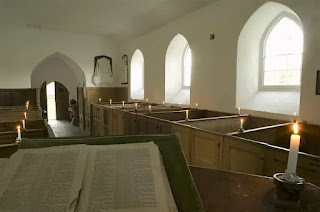Contours of Conformity 1662-1832: 'the excellency of our Church'
Central to this belief was the understanding that the faith and order of the Church of England was apostolical and primitive. Thus, it taught neither more nor less than the Apostolic faith, as set forth in the Scriptures and confirmed in the consensus of the wider Church catholic; and it ordered its common life after the "the pattern of the Primitive and Apostolical Church":
And hence appears the excellency of our Church, in that it requires nothing to be believed, as an article of faith, or as necessary to Salvation, but what the Apostles first taught, and what the Church of Christ in all ages hath believed to be consonant to the doctrine contained in their writings; but whatsoever opinion hath no ground or foundation in the said Apostolical writings, that ours together with the Catholic Church, rejecteth, as either utterly false, or at best not necessary to be believed; and therefore in order to your continuing steadfast as the first Christians did, in the Apostles' doctrine, the surest way is to keep close to the doctrine of our Church, which is plainly the same with that of the Apostles in all points, without any addition, diminution, or alteration whatsoever; which is the great glory of our Church, and should make us not only to continue firm and dutiful to it, but likewise to thank God, that we live in such a Church, wherein we are duly instructed in all the great truths which our Saviour and His Apostles taught, and are not required to believe any thing else, as necessary to our being saved; by which means as our minds may be enlightened, and our hearts purified by that faith which was once delivered to the Saints; so we are secure from falling into any damnable heresy, and from being corrupted or perplexed with any of those new and dangerous opinions which the ignorance and superstition of after ages have brought into the Church.
... lay aside all prejudices, and impartially consider the constitution of our Church, as it is now reformed, they might clearly see, that as there is nothing defective, so neither is there any thing superfluous in it, but that it exactly answers the pattern of the Primitive and Apostolical Church itself, as near as it is possible for a national Church to do it; insomuch, that they who truly believe all that she teaches, and practise all that she requireth, may be as pure and holy as any of the first Christians, or the Apostles themselves were, or can be, so long as they continue in the Church Militant here on earth.
It might appear to be counter-intuitive to describe a claim for "the excellency of our Church" as modest, but modesty is central to it: no distinctive doctrines or teachings, no claims for exclusive salvation, no order but that which has been received, no authority to proclaim any doctrine essential to salvation beyond what is set forth in the Scriptures, and an ecclesial life centred around "the great truths which our Saviour and His Apostles taught" rather than distinctive doctrinal insights or formulations. Here, in other words, is that combination of catholicity and generosity, confidence and modesty which should shape and characterise Anglicanism at its best.




Comments
Post a Comment